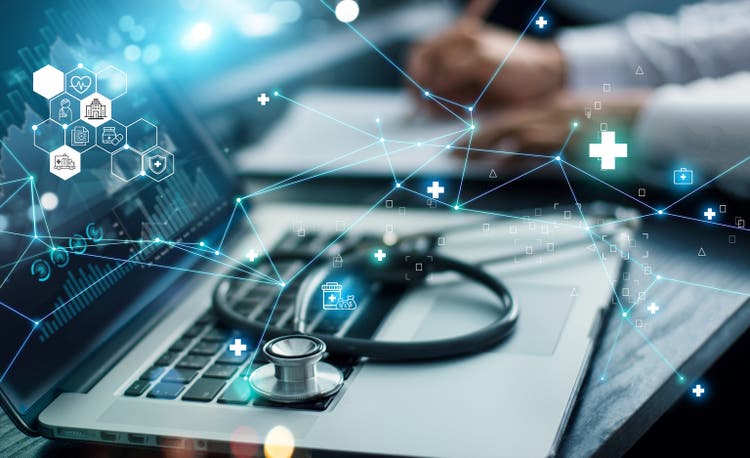When ChatGPT entered the conversation a few years ago, Lloyd B. Minor, a surgeon and the dean of the Stanford School of Medicine, sought to test its ability by asking it about a rare inner ear condition called superior canal dehiscence syndrome. Minor had personally discovered the syndrome, wrote the first paper on it, and developed a surgical procedure to fix it, naturally making him an expert on the subject. The response, he says, was not only concise, accurate, and logical, but as good as anything he could have written.
“The way it assimilated the information and presented it was really quite remarkable. And that’s when I realized this is not just an incremental advance. [Large language models] are going to fundamentally change the way we access, learn, and embrace knowledge … and I think this is a fundamental shift for medicine,” Minor says.
It’s a sentiment felt widely across the medical field as AI starts to touch nearly every corner of medical research, physician training and processes, and patient care. The rollout of AI across health care is not without challenges, but in some cases, the impact is already being realized.
LLMs boost medical research
Perhaps the most visible way AI is impacting the industry is in medical research. Machine learning model AlphaFold2, unveiled by Google DeepMind in 2020, made it possible to predict the structure of virtually all the 200 million proteins that researchers have identified, opening up avenues to design novel proteins and streamlining the first step in drug research. The model has since been used by more than 2 million people from 190 countries, earned its creators the Nobel Prize, and ignited a boom of new biotech startups. Last year, the first AI-targeted and AI-designed drug—an idiopathic pulmonary fibrosis treatment developed by startup Insilico Medicine—reached Phase II clinical trials, marking a new milestone for the technology. While no AI-developed drug has made it to patients just yet, the advancements in research processes are already making a material difference.
“Recent advancements in artificial intelligence are revolutionizing active compound discovery by dramatically enhancing the efficiency, accuracy, and scalability previously challenged by traditional methods,” reads a paper exploring the impact AI is having on drug discovery, published last month in Nature by a dozen researchers.
The research impacts aren’t limited to drug discovery, however. An AI model developed by Cambridge researchers outperformed clinical tests in predicting the progression of Alzheimer’s disease, in one example. Another out of Harvard was found to accurately detect multiple types of cancers, assess treatments, and predict survival rates. In June, Google DeepMind followed up its line of scientific research models with AlphaGenome, a model designed for a wider swath of biology research by predicting how single variants or mutations in human DNA sequences can impact biological processes regulating genes.
Improving the physician and patient experience
The parts of the medical industry being most immediately impacted by AI, according to Wiljeana Glover, a researcher focused on health care innovation and improvement at Babson College’s Kerry Murphy Healey Center for Health Innovation and Entrepreneurship, are the backend processes. For example, large language models are being used in emergency departments to quickly create synopses of complex medical records, and to record and transcribe conversations between providers and patients to generate medical documents.
“Things that we’re taking off of the clinicians’ plate, that are more administrative, I think those are some of the places where we see AI moving really quickly,” she says.
According to a 2020 study, physicians spend 33.4% of their work-related time on non-patient-facing health records and administrative tasks. They then spend an average of two hours per day on these tasks outside their official work hours including on weekends, making administrative tasks a leading cause of the burnout plaguing the medical field. Reducing this load not only can give providers more time to focus on direct patient care, but improve the patient experience as well—for example, allowing physicians to make eye contact with patients during visits rather than typing notes.
By improving access to information—and thus treatment—AI can have a notable impact on the physician and patient experience. Large language models allow physicians to more easily query databases containing assimilated knowledge to research potential treatment paths for complex cases. Physicians are also increasingly using AI-powered patient care apps alongside wearables to support ongoing treatment for chronic conditions like hypertension and diabetes, providing more information about the patient’s health outside of in-person visits and increasing communication, Glover says.
In some cases like radiology, health professionals are now regularly working alongside AI as a routine part of their work. Radiologists are using AI to sharpen images, identify abnormalities, and discern subtle changes in areas of concern—essentially using it like a magnifying glass to uncover more information to then evaluate with their expertise. One AI model developed by Northwestern University researchers that can evaluate breast cancer tissue from digital images was even found to perform better at predicting the future course of a patient’s disease than expert pathologists, which could help spare patients unnecessary chemotherapy and reduce the duration and intensity of treatments.
A new training paradigm
Even prior to large language models, AI was starting to change what part of physicians’ knowledge base they had to access in their daily work. Minor said that when he was in medical school, they had to memorize medication dosages and indications. Now, they use AI algorithms to optimize dosages based on patient and drug data. A paper in BMC Medical Education says AI has come to play “a crucial role in dose optimization and adverse drug event prediction, offering significant benefits in enhancing patient safety and improving treatment outcomes.”
As AI increasingly impacts how physicians work, medical schools are updating how they train doctors. George Washington School of Medicine and Health Sciences will be offering a new course this fall on artificial intelligence applications in health care, and the Icahn School of Medicine at Mount Sinai said it will start giving all students access to ChatGPT Edu along with training on how to use it.
The Stanford School of Medicine, Minor says, is in the early stages of reimagining its entire curriculum in light of the advances in generative AI, and the school has formally appointed one of its MD-PhDs in AI to lead its exploration. Minor emphasizes that he’s not suggesting the field move away from requiring a base of medical knowledge, but that learning how to deploy generative AI to augment the ability of physicians to keep up-to-date and bring relevant knowledge to each individual patient needs to be explored educationally.
“We want to be a pace-setter. We also don’t abandon the essential elements of medical education. But I think defining what those essential elements are should be something we do in a thoughtful way, rather than just assuming that what everyone had to learn in the past, and how they have to learn it, is going to apply moving forward,” he says.
AI is also emerging as a useful training tool in its own right. Researchers at New Jersey Institute of Technology, Robert Wood Johnson Medical School, and software company Robust AI developed an AI-powered program that allows students to simulate the basic movements of laparoscopic surgery and provides feedback so they can continuously improve. A recent study from this year showed the program is as good and even slightly better than faculty human evaluators at rating surgical skills.
Far from perfect, but here to stay
The wide variety of uses for AI within the medical industry isn’t without challenges, drawbacks, and issues that need to be solved.
Even with all the potential for research breakthroughs, drugs being developed with AI still need to be tested in wet labs using physical samples, go through clinical trials, and gain FDA approval. The medical documentation systems being popularized by companies like Augmedix, Abridge, and Microsoft-backed Nuance bring the risk of error and hallucination (though it’s worth pointing out that humans—especially ones who are burned out—make errors, too). Algorithms designed to detect illness and injury, and make care decisions, have historically underperformed with women and people of color, largely because of these groups’ underrepresentation in the datasets used to train such AI systems. There are also privacy concerns surrounding the training of AI models with patient data.
“I think we’re moving cautiously, and I think the caution is ideal,” says Glover. “But absolutely, the way that patients seek, reach, and receive care will be impacted by AI. It’s happening. It’s here.”
This story was originally featured on Fortune.com

 7 hours ago
1
7 hours ago
1











 English (US) ·
English (US) ·